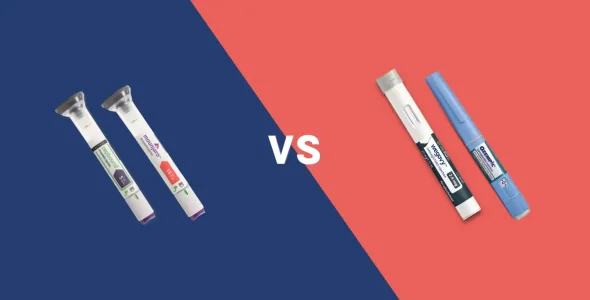How long does it take for tirzepatide to suppress appetite?
How fast does tirzepatide kick in? Uncover the truth about its appetite suppression timeline.
Key highlights
- Appetite suppression is key to weight management, helping you control your food intake and reach your weight loss goals.
- Tirzepatide works by controlling hunger through satiety signals, making you feel fuller for longer and eat less.
- Higher doses work faster and more intensely. Lower doses take longer to show results.
- Individual factors like metabolism, body composition, treatment adherence, and lifestyle choices affect how fast tirzepatide suppresses appetite.
- Eating healthy, exercising regularly, and being consistent with treatment can boost the medication’s effect.
- Consult with your healthcare provider for personalized advice and to ensure safe and effective use of tirzepatide
Appetite suppression is key to weight management. Reducing hunger and cravings helps you control your food intake, maintain a healthy weight and hit your weight loss goals. Without appetite control, sticking to your diet plan can be challenging, especially if you’re an overeater or emotional eater.
Tirzepatide (Mounjaro and Zepbound) is an FDA-approved dual-action GLP-1/GIP receptor agonist from Eli Lilly used to treat type 2 diabetes and chronic weight management in combination with a low-calorie diet and exercise. It also helps people with obstructive sleep apnea by reducing body weight, which can alleviate symptoms.
Tirzepatide helps regulate hunger by influencing the brain’s satiety signals, making you feel full and eat less.
Explore the process of appetite suppression with tirzepatide. Discover factors that influence how quickly it works and what to expect during treatment.
How tirzepatide works
Tirzepatide, also known by the brand names Mounjaro and Zepbound, is an FDA-approved dual-action GLP-1/GIP receptor agonist made by Eli Lilly.
Zepbound is used for long-term weight management in adults with obesity (with a body mass index of 30 or higher) and overweight (with a body mass index of 27 or higher) with at least one weight-related condition, such as high blood pressure, type 2 diabetes, or high cholesterol.
Mounjaro was FDA-approved in 2022 for managing blood sugar levels in adults with type 2 diabetes. Tirzepatide can significantly reduce HbA1c levels, a key measurement reflecting average blood glucose levels over 3 months.
Tirzepatide mimics two hormones, glucagon-like-peptide-1 (GLP-1) and glucose-dependent insulinotropic polypeptide (GIP) receptors, that help your pancreas release more insulin. This dual action boosts insulin release, helps manage fat storage, makes you feel fuller longer, reduces appetite, and helps you lose weight faster. It also helps with gastric emptying, slowing the time it takes for the stomach to empty, and interacts with areas in the brain that signal satiety.
Tirzepatide works differently from similar medications like Wegovy and Ozempic (which contain the active ingredient, semaglutide) because it targets two hormones, GIP and GLP-1.
Studies have also shown that tirzepatide provides improvements in people with obstructive sleep apnea (OSA) and Zepbound was recently approved by the FDA for this indication.
Timeline for appetite suppression
The progression of appetite suppression while using tirzepatide is typically associated with the dose and how the body adapts to the medication. Here’s a detailed look at how appetite suppression develops over time:
Initial effects
Some users may begin to notice mild appetite suppression within the first few weeks of starting tirzepatide. However, the effect might not be very pronounced during this early stage.
In the first few weeks of starting tirzepatide, you might start feeling mild appetite suppression. At first, this effect might not be very noticeable.
People often experience nausea, a decrease in appetite, some mild gastrointestinal discomfort (bloating or constipation, for example), or changes in digestion. Those side effects can contribute to eating less. As your body gets used to the medication, you might start to feel less interested in food. This interest wanes gradually and can vary a lot from person to person.
By the end of week two to four, appetite suppression becomes more noticeable for many users. As your body adapts to tirzepatide’s mechanism of action, the appetite suppression effects tend to get stronger.
Full effects
Tirzepatide starts affecting insulin right away, which can help slow weight gain, lower the risk of type 2 diabetes, and reduce fatigue from blood sugar spikes. While some people feel less hungry after their first dose, it may take a month or more for others to notice this effect.
It usually takes about 24 hours for the medication to be fully absorbed and start working.
Weight loss with tirzepatide varies for each person, depending on factors like diet, exercise, age, and other medications.
Most people start losing weight within one to two months, especially if they follow a healthy lifestyle. It can take a bit longer for some people.
While some may see results at lower doses, more significant weight loss usually happens with higher doses. For best results, it’s recommended to use tirzepatide over a long period to support long-term weight loss.
Individual response to the medication
The time it takes to feel the full appetite suppression of tirzepatide can vary depending on several personal factors.
Metabolism also comes into play. Faster metabolizers feel effects quicker and slower metabolizers see changes more gradually.
Consistency of treatment is key as inconsistent use can delay the full benefits.
Body composition and health status (initial weight and conditions like type 2 diabetes) can also affect how well tirzepatide works.
Lifestyle factors like diet, exercise, and stress levels can impact the medication’s effectiveness. Healthier habits speed up the process. While some people see appetite suppression in weeks, it may take others a few months to feel the full effects.
Factors influencing appetite suppression
Certain factors can influence the appetite suppression effect of tirzepatide, such as:
Dosage and titration schedule
Tirzepatide is administered as a subcutaneous injection once a week. The initial dose is low and the dose is gradually increased every 4 weeks to avoid side effects. Most people start on 2.5 mg once weekly and the dose is increased every 4 weeks until an effective maintenance dose is reached (7.5 mg – 15 mg once weekly).
The dosage of tirzepatide plays an essential role in how quickly and effectively you experience appetite suppression. At lower doses, you might not notice the effects as much. Higher doses tend to lead to more pronounced appetite reduction.
As you increase the dose over time, the appetite-suppressing effects often become more apparent. Most patients find that’s when the benefits start to kick in—and that can take a few weeks. Your body needs time to adjust to the medication before the appetite-suppressing effects become more consistent.
Individual metabolism and body composition
Gender, age, weight, and overall health can influence how a person responds to tirzepatide. For example, gender may affect how the body processes the medication, with some studies showing different responses in men and women.
Age also plays a role. Metabolism tends to slow down with age. Hormone levels change too, which can affect how well the drug works.
Weight is another key factor. People with higher body weight may see more significant appetite suppression and loss benefits.
Lastly, overall health, including conditions like diabetes, heart disease, or kidney issues, can impact how well tirzepatide works and how the body handles it, making it important for doctors to tailor treatment to each individual.
Dietary habits and lifestyle factors
Dietary habits and lifestyle factors significantly impact how well tirzepatide works for you.
A healthy diet rich in whole foods, lean proteins, fruits, and vegetables is essential. Eating more whole foods, lean proteins, fruits, and vegetables, and cutting back on processed foods, sugary snacks and overeating will help you get the most out of the medication.
Regular physical activity is just as important. Exercise boosts your metabolism, burns calories, and improves your overall well-being.
Your lifestyle choices like getting enough sleep, managing stress and staying hydrated can all help tirzepatide work more effectively in your body. Conversely, poor habits like lack of sleep or high stress can hinder the medication’s effectiveness.
Underlying health conditions and medications
Certain underlying health conditions such as diabetes, high blood pressure or kidney issues can affect how well tirzepatide works and how your body responds to the medication. For example, people with diabetes may see more noticeable improvements in blood sugar control, while those with kidney issues may need a lower dose or more monitoring.
Medications that interact with tirzepatide like insulin or other diabetes medications may increase the risk of low blood sugar so dosage adjustments may be needed. Be sure to discuss all existing health conditions and medications with your healthcare provider to make sure tirzepatide is safe and effective for you.
Genetic predisposition
Genetic factors can also affect how you respond to tirzepatide. For example, some people may have genetic variations affecting how their body processes the medication or how their appetite and metabolism are regulated.
These genetic differences can cause variations in how quickly or effectively tirzepatide works for weight loss or appetite suppression. While genetics can play a part, lifestyle choices and other health factors are often just as important in determining the overall effectiveness of the treatment.
What to expect when using tirzepatide
Tirzepatide can significantly reduce HbA1c levels, a key measurement reflecting average blood glucose levels over 3 months.
Tirzepatide has shown promising weight loss results in a short time. In a clinical trial, participants lost an average of 6.9% of their weight after 12 weeks. After 84 weeks, tirzepatide participants lost an average of 26.6%.
In another clinical trial, tirzepatide helped people lose more weight than a placebo over 72 weeks. Participants taking tirzepatide lost up to 15.7% of their body weight at doses of 5 mg, 10 mg, or 15 mg. The mean weight loss was up to 15.0% for the 5 mg group, 19.5% for the 10 mg group, and 20.9% for the 15 mg group.
Furthermore, a significant number of participants (85% to 91%) lost at least 5% of their body weight. The placebo group, on the other hand, experienced a much smaller weight loss of just 3.1%.
Initial side effects
Common side effects when starting tirzepatide may include:
- Nausea
- Vomiting
- Diarrhea
- Stomach pain
- Decreased appetite
- Risk of low blood sugar
- Constipation
Serious side effects of tirzepatide can include pancreatitis (inflammation of the pancreas), gallbladder problems, kidney problems, and severe allergic reactions. It can also cause low blood sugar, especially if you are taking other diabetes medications, so monitor your blood sugar levels regularly. Some people may have mild reactions at the injection site, like redness or irritation.
Tirzepatide has a black box warning from the FDA for the risk of thyroid C-cell tumors, including medullary thyroid carcinoma (MTC).
Long-term effects
Long-term use of tirzepatide can support sustainable weight loss, help blood sugar control and reduce the risk of type 2 diabetes. Many people also experience long-term improvements in overall health such as increased energy and less fatigue.
Tirzepatide may reduce appetite at first but the effects may become less noticeable as the body adjusts over time. Some people may still experience appetite suppression long-term but others may find the effects become milder.
Other metabolic health benefits of tirzepatide
Tirzepatide helps to improve blood sugar levels by increasing insulin production and reducing glucose production in the liver. This can lead to better insulin sensitivity, which is helpful for people with type 2 diabetes.
Tirzepatide may improve lipid profiles by reducing levels of bad cholesterol (LDL) and triglycerides. These changes can reduce the risk of heart disease and improve overall cardiovascular health.
In addition to weight loss and diabetes control, tirzepatide may have benefits like better blood pressure, reduced inflammation, and better metabolic function, which can benefit overall health.
While tirzepatide is used for type 2 diabetes and obesity, some doctors may use it off-label for other metabolic conditions or weight loss in people without diabetes.
Potential side effects and safety considerations
Common side effects of Tirzepatide are nausea, diarrhea, and stomach discomfort. These side effects will decrease as your body adjusts to the medication. To manage them, start with a lower dose, eat smaller meals, and stay hydrated.
Rare but serious side effects are pancreatitis (inflammation of the pancreas), severe allergic reactions, and kidney problems. If you experience severe abdominal pain, difficulty breathing, or swelling of the face or throat, seek medical attention immediately.
Tirzepatide may interact with other medications, especially diabetes medications like insulin or sulfonylureas which could increase the risk of low blood sugar. Provide your doctor with a list of other medications or health conditions like kidney or liver issues before starting tirzepatide.
While the clinical trials look promising, the long-term safety and efficacy of tirzepatide, especially for weight loss, are still being studied. Current data suggest it is generally well tolerated, but monitoring for side effects over time is recommended, especially with long-term use.
Frequently asked questions
Can tirzepatide stop working for appetite suppression?
Yes, tirzepatide can stop working for appetite suppression over time as your body adjusts to the medication. Over time, many people notice slower weight loss progress, and the initial effects of the treatment, like reduced appetite and increased fullness, may become less noticeable.
What should I do if I don’t notice any changes in my appetite?
If you don’t notice any changes in your appetite, talk to your doctor to see if adjustments to your treatment are needed. They may recommend a different approach or check if other factors are affecting the results.
Are there ways to enhance the appetite-suppressing effects of tirzepatide?
To enhance the appetite-suppressing effects of tirzepatide, focus on maintaining a healthy diet and regular exercise. Your doctor may also suggest lifestyle changes or adjust your treatment plan to improve results.
How does tirzepatide compare to other appetite suppressants?
Tirzepatide is often more effective than many other appetite suppressants because it works on multiple hormones that control hunger. Unlike some other medications, it also helps improve blood sugar levels, making it an ideal option for people with diabetes or obesity.
2025 updates and future research
As of March 28, 2025, here’s what’s new with weight loss medications including tirzepatide.
Recent studies show tirzepatide also helps people with heart failure with preserved ejection fraction (HFpEF) and quality of life metrics.
Novo Nordisk’s collaboration with United Laboratories International focuses on UBT251, a triple agonist targeting GLP-1, GIP, and glucagon receptors. Phase 1 trials reported an average weight loss of 15.1% in the highest dose group, highlighting its potential.
Researchers are exploring myostatin inhibitors to promote muscle growth and fat loss. These could be beyond traditional weight loss medications.
In December 2024, the FDA removed tirzepatide from its official drug shortage list.
These developments underscore a dynamic and evolving field in weight management, with ongoing research poised to introduce more effective and personalized treatment options.
Tips for maximizing the benefits of tirzepatide
Here are a few things you can do to get the most out of tirzepatide:
Treatment adherence
Follow the dosage schedule as prescribed by your healthcare provider. Consistency is key to getting the best results and minimizing side effects.
Healthy lifestyle choices
Eat a balanced diet including a variety of healthy foods, fruits, veggies, lean proteins and whole grains. Limit processed foods, sugary snacks, and high-fat foods to support weight loss and overall health.
Exercise regularly and aim for at least 30 minutes of moderate exercise most days of the week. Combine cardio and strength training to burn calories, build muscle, and boost metabolism.
Consulting with your healthcare provider
Schedule regular appointments with your healthcare provider to track your progress, manage side effects, and adjust your treatment if needed.
Keep your doctor informed of any concerns, side effects, or changes in your health to get the best results from tirzepatide and other weight loss treatments.
Bottom line
When you start taking tirzepatide, you can expect appetite suppression to kick in gradually. It can take several weeks to a few months for your hunger and cravings to start decreasing. Everyone responds differently to the medication based on various factors.
You might feel some appetite suppression in the first couple of weeks, but by weeks 4 to 8, you’ll likely notice a reduction in hunger.
Factors such as dosage, individual metabolism, and treatment adherence can impact the timeline and effectiveness of appetite suppression.
Because everyone’s experience with tirzepatide is unique, working closely with your healthcare provider is important.
When you combine tirzepatide with healthy eating habits and regular exercise, you will see much better results.
For the best results, always consult your healthcare provider for personalized advice on tirzepatide treatment and make sure to follow the prescribed guidelines for a successful weight loss journey.





